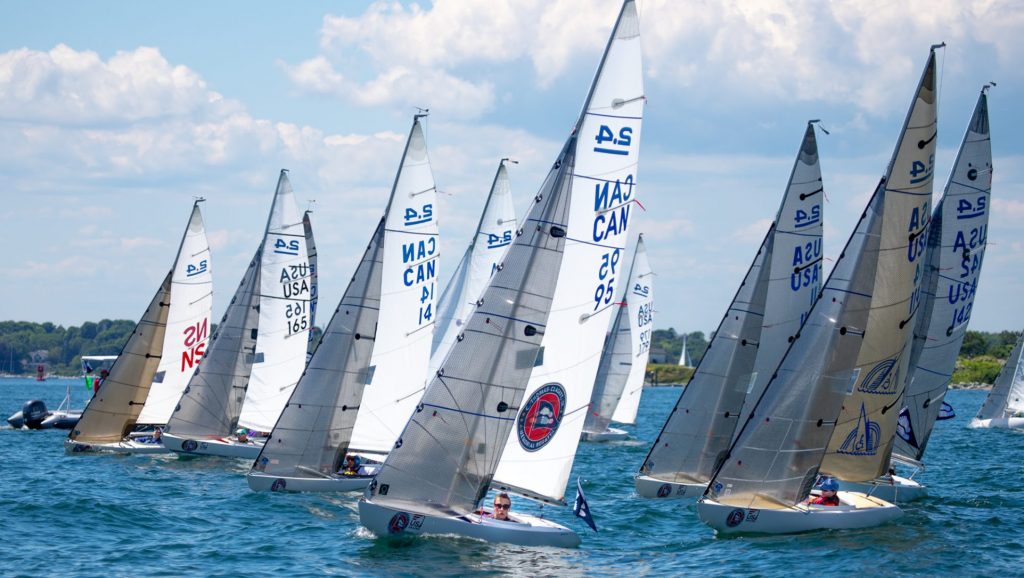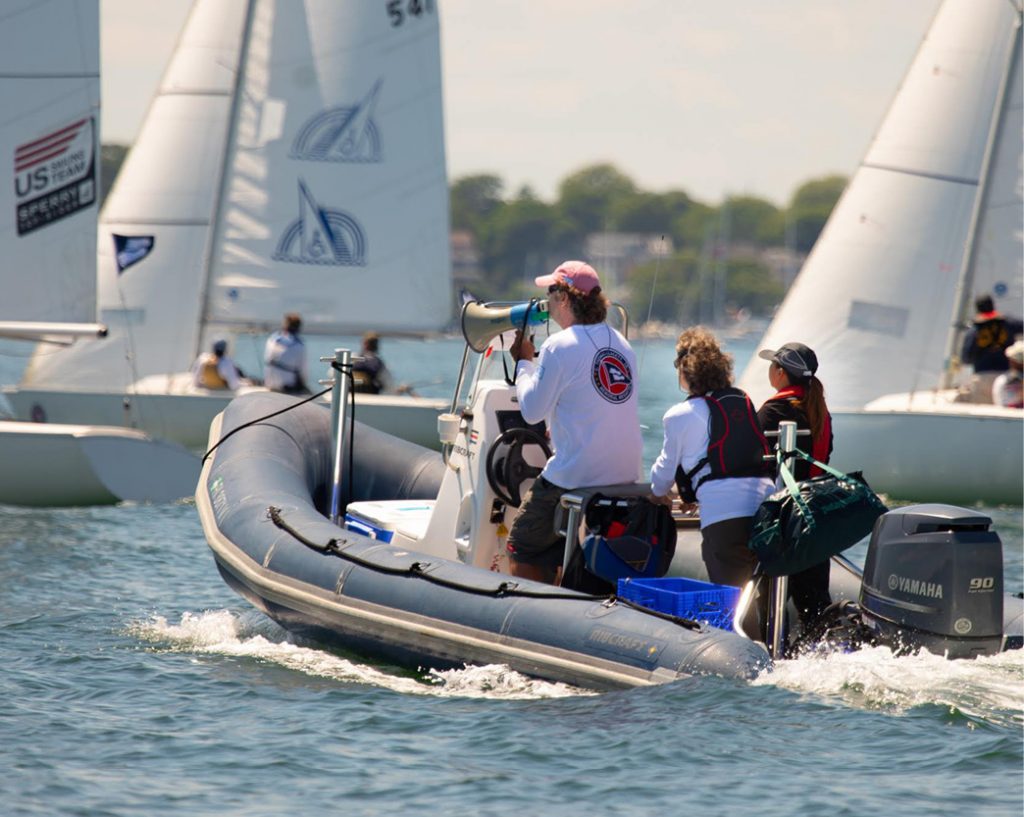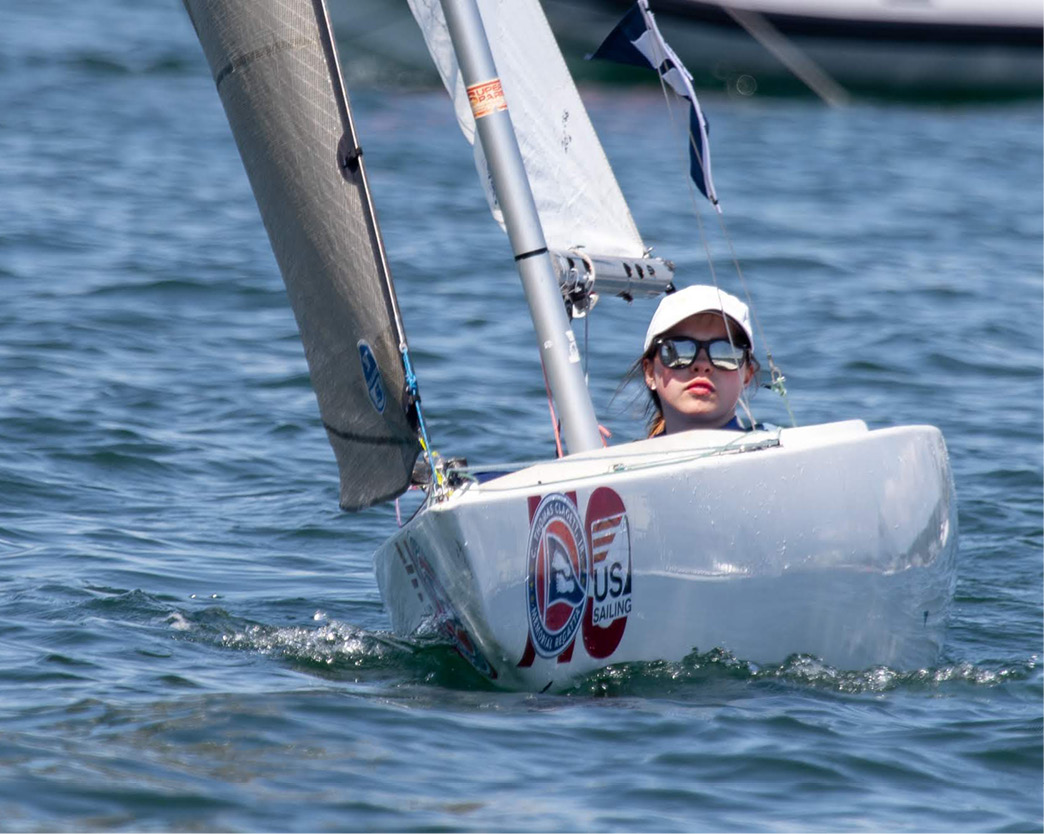
Clagett Regatta participants have won numerous medals in the Paralympic Games. © Clagett Regatta/Ro Fernandez
Ever think the world is kicking you in the shins? That life’s not fair? Feeling sorry for yourself? Go immediately to ClagettRegatta.org. Here you will learn about people doing things that will make you cringe that you ever thought you were having a bad hair day.
The C. Thomas Clagett, Jr. Memorial Clinic and Regatta honors the memory of Tom Clagett, a passionate sailor who contracted meningitis in his youth. Tom was paralyzed for a while and fortunately recovered, and the experience left a profound impression of what people with what then were known as handicaps can achieve.
Like much in sailing, The Clagett started in 2002 with a small band of like-minded folks brainstorming on ways to bring a higher level of sailing, training, coaching and mentoring to the universe of sailors with disabilities. They asked, “How do we get a bigger talent pool of U.S. sailors to compete in Paralympic competition?” Seventeen years later, the answer is unequivocally The Clagett Regatta.
The first regatta was hosted by Sail Newport in 2003, driven largely by Tom Clagett’s daughter, Judy Clagett McLennan, and his granddaughter, Stephanie McLennan. There were five teams and they sailed in Sonars. From this modest beginning, The Clagett has grown to be the signature regatta and coaching clinic for adaptive sailors in the country.
From the beginning, coaching has been an essential element of The Clagett. The founders wanted this to be more than just another pickle dish regatta by offering ways to help develop the skills and the universe of adaptive sailors. Every Clagett Regatta Newport is a five-day event, with the first two days focused on coaching and the last three on racing portion. After the first two coaching days, the coaches remain and hold briefings and debriefings on the race days. Dave Perry and Dave Dellenbaugh, two of the country’s most prominent and storied sailors, are consistent returning coaches. This effort must be doing something right, because Clagett participants have garnered upwards of 20 medals in Paralympic Sailing.

Sailors in The Clagett learn from the best coaches in the sport, including Dave Perry. © Clagett Regatta/Ro Fernandez
If attitude is a key ingredient in life and in sailboat racing, the participants in The Clagett would make Dale Carnegie look like a grumpy old man. Dave Perry tells a tale of one of his first appearances at The Clagett. The boats were sailing in, and he walked down the dock, as we all do, to assist a Sonar crew with docking. One of the crew was standing at the shrouds and Dave called over, “Hey, can I give you a hand?” The crew replied, “I’ll take the whole arm.” He was missing an arm.
Dave also believes that most Clagett sailors started sailing as adults. As any adult who likewise came to the sport without having grown up sailing as a kid knows and appreciates, it is a pretty intense experience for the first 50 hours or so. Think about your own first three-day, 30-hour sailing lesson experience. By the end of the first day, you felt like your head might explode with all the new terminology, data, commands, motions and sensations. Well, think about doing all that without an arm or a leg, without your sight, or perhaps without the ability to walk.
Another aspect noted by Sam Crichton, The Clagett’s public relations officer, is that although the sailors are adaptive, the coaching and competition are centered not so much around the humans, but the sailing skills: preparation, boat speed, sail trim, tactics, and the intellectual side of sailing they bring to bear on the racecourse. It is a very level playing field as far as a competitive activity is concerned.
To this end, while The Clagett (sailed in the singlehanded 2.4mR, doublehanded Martin 16 and triplehanded Sonar) is not a learn to sail program, the organizers are seeing more and more adaptive athletes from other sports, non-sailors, coming to “take a look” at sailing, for this very reason. Sam tells the tale of one able-bodied sailor, Tony Pocklington, the builder of the 2.4mR boats, who had his clock cleaned by adaptive sailors.
The Clagett coaching staff comprises some of the best in the game. For the 2019 Clagett Regatta Newport, to be held at Sail Newport June 18 – 23, the coaches include The Daves (Dellenbaugh and Perry), Betsy Alison, the US Sailing Team Paralympic Coach, Ken Legler, the Sailing Coach at Tufts, and Canadian Brian Todd, a successful coach with a resumé as long and impressive as any.
Prior to The Clagett, match racing for adaptive sailors was not available. So, in keeping with the original goal of expanding the universe of adaptive sailors, The Clagett has in the past couple of years expanded their efforts beyond traditional fleet racing and partnered with Oakcliff Sailing in Oyster Bay, NY to offer a match racing clinic and regatta. You think fleet racing as an adaptive sailor is tricky? Go off one weekend in your club’s fleet of J/22s, Ideal 18s or Sonars, set up some match racing courses and have at it.
Developing skills such as controlling a second boat with your own boat using the Racing Rules of Sailing and boat handling brings a new dimension to the field of sailing competition, adaptive or not. Think about a start in a big one-design fleet. The subtleties of slowing your boat just enough to block the other yet keeping way on so as to not be stuck dead in the water yourself require a tremendous feel for the boat. Things like covering the other boat (aka tacking duels), knowing when to tack, and tacking with precision and good timing – these are all skills that demand practice, teamwork, and consistency.
The 2019 Clagett/Oakcliff Match Racing Clinic and Regatta will be hosted by Sagamore Yacht Club in Oyster Bay September 20 – 22. While The Clagett Newport Regatta is open to all adaptive sailors, eligibility for The Clagett/Oakcliff Match Race is by application and invitation. The Sonars used in this event are loaned by The WaterFront Center in Oyster Bay, which offers all manner of courses and classes related to sailing and our sailing environment. On-the-water support is provided by SailAhead, an amazing organization founded by brothers Kilian and Sean Duclay with a mission of healing Armed forces veterans by introducing them to sailing.

Canadian 2.4mR sailor Siobhan MacDonald is a Clagett Boat Grant Program recipient. © Clagett Regatta/Ro Fernandez
Competitive sailing, especially in boats customized for adaptive sailors’ various needs, has a cash cost aspect that is very difficult to negotiate. Able-bodied folks can take sailing lessons at Sail Newport, for instance, and once qualified can rent a J/22 and sail all summer for a few bucks an hour, if split three or four ways. Adaptive sailing simply does not have that option, so The Clagett team has introduced two more additions to the organization’s root mission. One is the introduction of money grants to attend the regatta and the other is a boat grant program. Individuals or community sailing centers may apply, and grantees have the use of a boat and equipment for up to four years. To date, Sonars and five 2.4mRs have been granted to individuals and groups in San Diego, upstate New York and Canada.
Oh, by the way, quadriplegic sailors steer the boat with a “sip and blow” technique. This involves a tube positioned on the sailor so as to permit them reach it with their mouths and they, literally, either suck or blow into the tube to control the tiller and so maneuver the boat…which certainly provides a new perspective on just how good any particular maneuver was.
So, console yourself on that bad hair day that you are not sailing your Sonar upwind in 19 knots of wind over tide and steering by the sip and blow method. And go down to Sail Newport or Sagamore Yacht Club and see just what really tough sailors can do. For more information, log onto https://clagettregatta.org. ■
